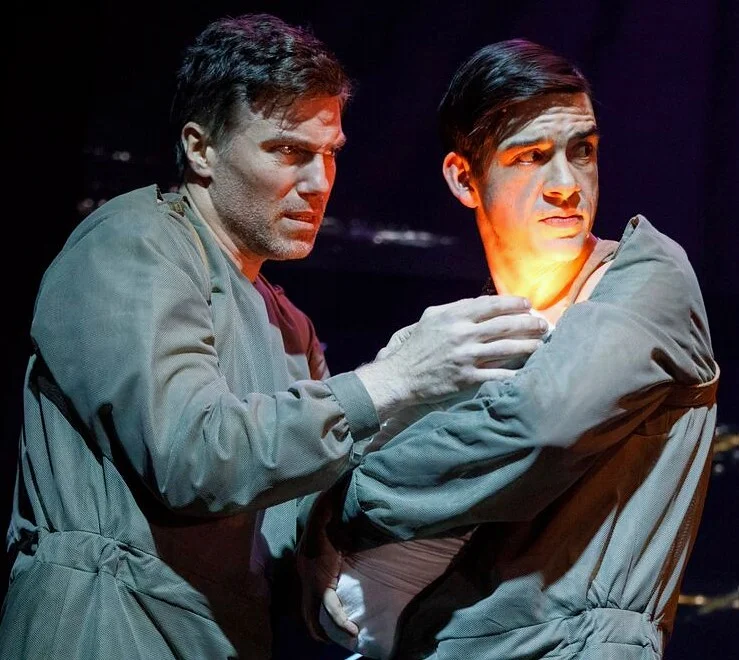Robert O’Hara’s new play, Mankind, opens with a gay couple’s strained pillow talk, as one man, Jason (Bobby Moreno), advises his partner, Mark (Anson Mount), that he is pregnant—by Mark. From that simple start O’Hara spins a broad, futuristic satire of sexuality, feminism, religion, commerce and talk shows. It’s more than the playwright is able to manage smoothly, and much of it feels familiar, but it has its moments before it arrives at its circular ending, one reminiscent of Ben Hecht and Charles MacArthur’s Twentieth Century.
O’Hara’s dystopian vision—so de rigueur in recent drama that it now feels stale—takes place in a future where women have disappeared, purportedly because of climate change (O’Hara drags in this hot-button issue and then leaves it dangling). Men have somehow survived the poisoned atmosphere and adapted to the extinction of women by having children themselves; homosexual relations are the only option. O’Hara milks the situation for some comic relief, which the skillful Mount and Moreno put over with characters who clearly know which parent they’re referring to at all times in their loopy conversation.
Jason: My father died last month...
Mark: ... Yes. You told me... I’m sorry...
Jason: …My father and father divorced when I was 15 and my father took me to go live with his fathers. It was my grandfathers who really raised me. Because my fathers weren’t particularly interested. We lived with my grandfathers until I went to college. Then they finally kicked my father out.
Ariel Shafir (left) is one half of Bob & Bob, talk-show hosts, and David Ryan Smith is the other, in Robert O’Hara’s Mankind. Top, from left: André De Shields as a father, Anson Mount as Mark, and Stephen Schnetzer as another father of the heroes.
Futuristic science-fiction visions can be useful—Alan Ayckbourn has incorporated them skillfully into plays like Communicating Doors, Comic Potential, and Wildest Dreams—but O’Hara hasn’t the same level of ability or that much control of his evident talent. Here the levity is too often overwhelmed by darkness and despair. Alex Jainchill’s lighting of Clint Ramos’s dark, shadowy set and the revolving square on which many scenes take place is accordingly grim. A few minimal touches of neon, though, make the future setting credible.
Mark and Jason are prosecuted for seeking an abortion, which is illegal in this society, and their stylish and contemptuous prosecutor is played by André De Shields, who combines his trademark physical dexterity with a menacing vocal lubricity as he recites their sexual transgressions and pulls some grins from the material. (De Shields later takes on the less flashy role of one of the four fathers.)
The birth of the child while the lovers are in prison—the first girl born in a century—leads to tragedy, talk-show celebrity and the founding of a new religion. That, in turn, becomes allied with a political feminist movement—led necessarily by men who want to bring back women, although the prospects of their doing it are never persuasive.
O’Hara also levels his guns at the way organized religion is monetized, as Jason, the controlling high priest (along with Mount’s morose, more reluctant Mark) repeatedly asks variations on, “How much will you pay me?” Whether it applies to assuming the priesthood or writing a Bible, Jason’s interest is to convert others’ devotion into profits.
At the end of the first act the play goes off the rails with an interactive religious service that feels unnecessarily awkward, as various devotional paraphernalia are passed around and the audience is coerced into participation. Like many writers who choose to direct their own works (but unlike Ayckbourn, who excels at it), O’Hara doesn’t recognize this misstep.
Mount (left) with Bobby Moreno as Jason. Photographs by Joan Marcus.
The play’s energy jumps a bit after intermission with a good sight gag, but it doesn’t recover enough and ultimately lurches its way to the finale. The journey includes a tired satire of a talk show, Bob & Bob, in which David Ryan Smith plays one Bob as an ebullient co-host and Ariel Shafir puts on a consciously stilted, louche accent as the other. Both are dressed by Dede M. Ayite in full leopard-skin outfits. The designer has also found glittering pastel garb and headdresses for the priests of Cry-baby—the name of Jason and Mark’s child, who becomes the focus of a religion, one in which cardinals inexplicably still look like cardinals and that incorporates feminism, bogus spirituality, and concealed riches.
Talking about the religion, the less committed Mark finds the blood uncomfortable, leading to some heavy-handed commentary. “It’s a sign of their belief and commitment to redemption,” says Jason. “It’s disgusting,” Mark replies. “What do you expect?” says Jason. “It’s a religion. They need a body and they need it to be dead. And bloody.” Mount and Jason do their best with characters who come off more as puppets to be manipulated for the plot’s sake.
Mankind, one hopes, is only a way station to a point when O’Hara manages to channel his energies and abilities to something more coherent. It might also help if he assigned directing duties to someone less invested in the writing and more astute in giving focus to his work.
Mankind plays through Jan. 28 at Playwrights Horizons (416 West 42nd St.). Evening performances are at 7 p.m. Tuesday and Wednesday, 8 p.m. Thursday through Saturday, and 7:30 p.m. on Sunday; matinees are at 2:30 p.m. Saturday and Sunday. For tickets, call Ticket Central at 212-279-4200 or visit playwrightshorizons.org.





